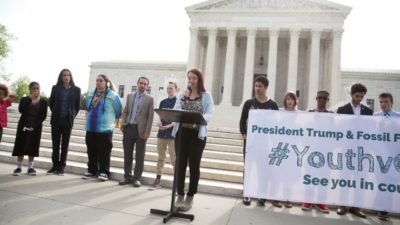statutory interpretation
Taming Textualism: A Guide for Environmental Lawyers
How to Argue Cases to Conservative Judges
Textualism is the dominant method of interpreting statutes among conservative judges. It purports to base interpretation on the “ordinary meaning” of the statutory language. This approach ignores traditional tools of statutory interpretation like considering what was actually said in Congress. Ignoring what Congress actually intended seems odd to me. Still, lawyers have to make arguments …
Continue reading “Taming Textualism: A Guide for Environmental Lawyers”
CONTINUE READINGFancy Dancing on the Appalachian Trail
How to Use Textualism to Evade Statutory Texts
The Supreme Court’s decision in Cowpasture case allows gas pipelines to cross the Appalachian trial. The ruling didn’t get much attention because of its timing. It came down the same day as Bostock, which outlawed employment discrimination against gays and transsexuals. Bostock featured a big battle over the meaning of textualism. But Cowpasture was also …
Continue reading “Fancy Dancing on the Appalachian Trail”
CONTINUE READINGHappy Birthday, Chevron Doctrine!
The Chevron doctrine has been a keystone of administrative law. But now it’s under siege.
Thirty-six years ago today, the Supreme Court decided the Chevron case. The case gives leeway to agencies when their governing statutes are unclear or have gaps. It’s probably the most frequently cited Supreme Court opinion ever. But now the Chevron doctrine is under fire from conservatives, who used to be its strongest advocates. Here’s how …
Continue reading “Happy Birthday, Chevron Doctrine!”
CONTINUE READINGPrinciples of Climate Governance
We need to address the procedures and structures for climate policymaking.
There’s a lot of discussion about the substance of climate policy today. That’s obviously critical, but we also need to think about the procedural and institutional issues involved in making climate policy. For instance, we need to think about how to divide authority between the states and the federal government. I thought it would be …
Continue reading “Principles of Climate Governance”
CONTINUE READINGJustice Stevens and the Rule of (Environmental) Law
A simple but powerful principle: courts and agencies should respect statutes.
Justice Stevens and the Rule of (Environmental) Law There’s already been a lot written in the aftermath of Justice Stevens’s death, including Ann Carlson’s excellent Legal Planet post last week. I’d like to add something about an aspect of his jurisprudence that had great relevance to environmental law: his belief in the rule of law, …
Continue reading “Justice Stevens and the Rule of (Environmental) Law”
CONTINUE READINGWhat’s Wrong with Juliana (and What’s Right?)
The odds against the “children’s case” are bad and getting worse. But there’s a valid insight at its core.
Juliana v. United States, often called the “children’s case,” is an imaginative effort to make the federal government responsible for its role in promoting the production and use of fossil fuels and its failure to control carbon emissions. They ask the court to “declare the United States’ current environmental policy infringes their fundamental rights, direct the …
Continue reading “What’s Wrong with Juliana (and What’s Right?)”
CONTINUE READINGSeparated at Birth? No, not really.
Trump’s pro-coal EPA plan equates two legal provisions with little in common.
Trump’s plan for coal-fired power plants, like Obama’s plan to cut carbon emissions, is based on section 111(d) of the Clean Air Act. But much of the legal argument relies on an analogy to section 165 to support EPA’s very restrictive interpretation of section 111(d). It’s that restrictive interpretation that leads the agency to reject …
Continue reading “Separated at Birth? No, not really.”
CONTINUE READINGThe Chevron Doctrine: Is It Fading? Could That Help Restrain Trump?
The Supreme Court may be shifting the rules for reviewing agency interpretations of statutes.
In June, the Supreme Court decided two cases that could have significant implications for environmental law. The two cases may shed some light on the Court’s current thinking about the Chevron doctrine. The opinions suggest that the Court may be heading in the direction of more rigorous review of interpretations of statutes by agencies like …
Continue reading “The Chevron Doctrine: Is It Fading? Could That Help Restrain Trump?”
CONTINUE READINGThe Anthropocene and public law
Major doctrinal changes could occur in constitutional law, administrative law, criminal law
In this post, I will discuss ways in which the Anthropocene might affect public law doctrines, focusing on constitutional law, administrative law, statutory interpretation and criminal law. Again, the changes here are driven by three characteristics of the interaction of the Anthropocene with the legal system that I have developed in my prior posts: a …
Continue reading “The Anthropocene and public law”
CONTINUE READINGEverything You Always Wanted to Know About the Chevron Doctrine
This doctrine, formerly known only to specialists, will play a large role under Trump.
During the Gorsuch nomination, there was a lot of talk in the press about the Chevron doctrine. Most people have never heard of this doctrine, and only a few are aware of all the nuances. As the Trump Administration’s rulemaking efforts come before the courts, we’re going to be hearing a lot more about it. …
Continue reading “Everything You Always Wanted to Know About the Chevron Doctrine”
CONTINUE READING








